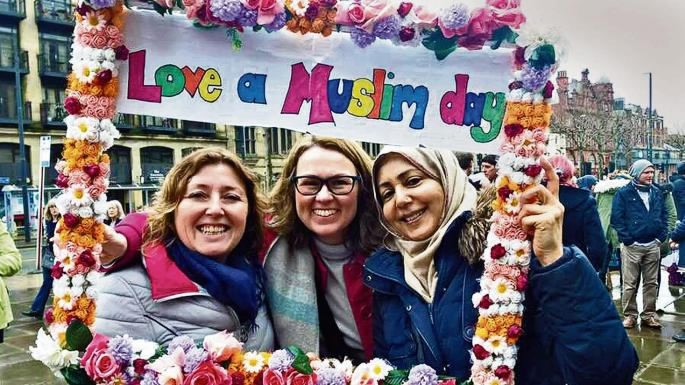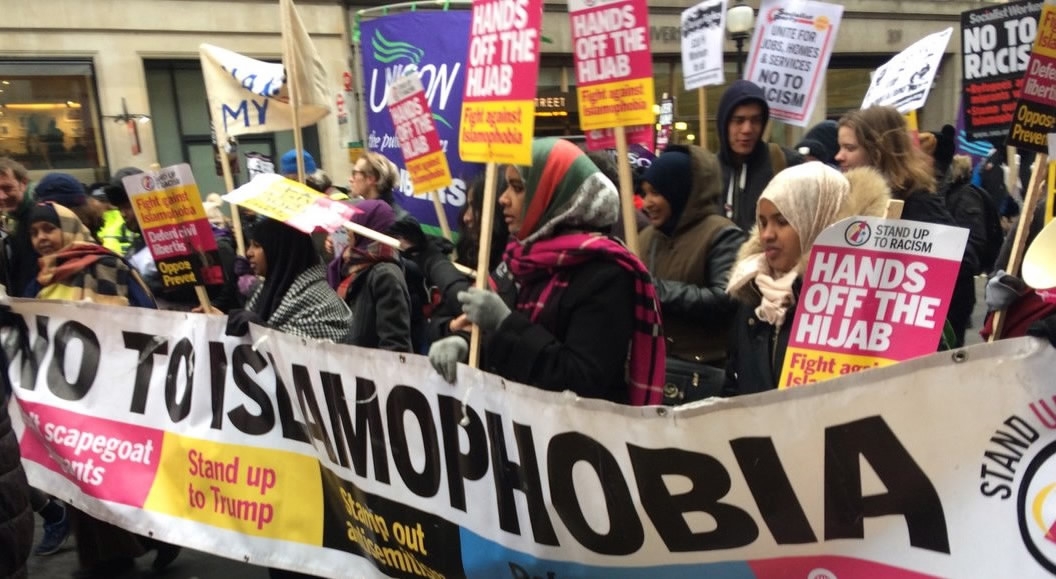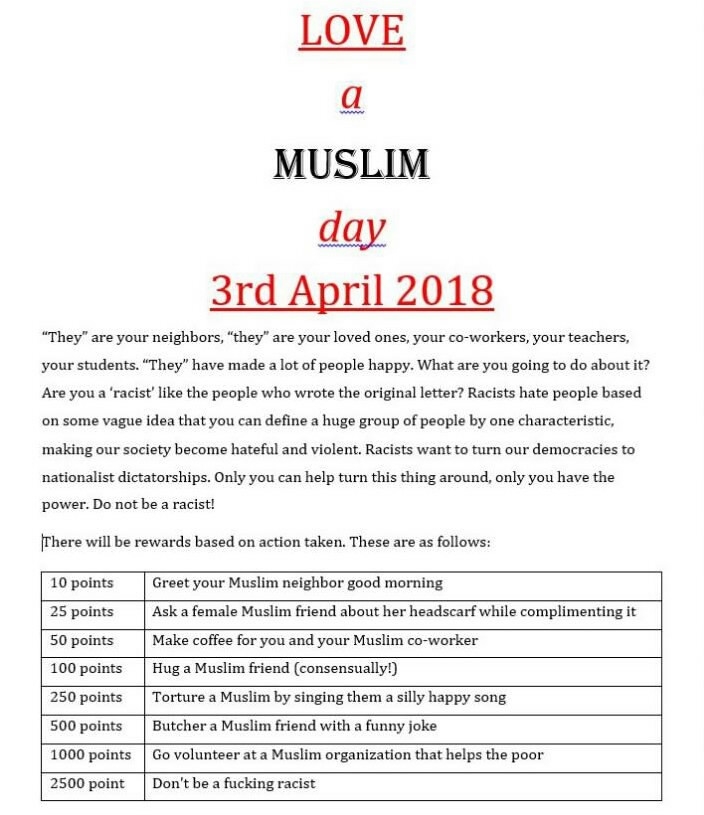
World
19:54, 04-Apr-2018
Communities in UK counter ‘Punish a Muslim’ with ‘Love a Muslim’ day campaign
By Abhishek G Bhaya

A vicious campaign in the UK calling to mark April 3 as “Punish a Muslim Day” was met with an equally vigorous “Love a Muslim Day” counter campaign on Tuesday as communities across the country united to defeat the vile threats circulated through anonymous letters.
BBC reported that the anonymous letters urging people to “Punish a Muslim” on April 3 arrived three weeks ago in homes in Bradford, Leicester, London, Cardiff and Sheffield. Muslim lawmakers also received the ominous letter, reported The Guardian.
The letter suggested people could win “rewards” based on “points” for various activities targeting Muslims, including abusing someone; removing a headscarf from a woman; throw acid on face; beating up; torture through electrocution; butchering someone using gun or knife; burning or bombing a mosque; and finally nuking the Islamic holy city of Mecca in Saudi Arabia.

A screenshot of the "Punish A Muslim Day" letter.
A screenshot of the "Punish A Muslim Day" letter.
The Metropolitan Police in London has launched an investigation to identify those responsible for the letter, but has assured that no credible information had been received to suggest any attacks were planned.
Urging communities to stand together, a police spokesperson said: “These messages seek to cause fear and mistrust among our communities and to divide us. Yet in spite of this our communities have shown strength in their response to such hatred and in their support for each other.”
'Too scared to leave home'
As the malicious letters started circulating among multiple communities over the last weeks and made their way onto social media, they sparked fears of violence with several Muslim people admitting being too scared to leave home on Tuesday, with women particularly nervous they might have their veils torn off on the street.
Mariyah Zaman, a 19-year-old media student in Cardiff, told BBC that they day symbolized the growing anti-Muslim sentiment that’s sweeping through the UK and Europe.
"Islamophobia has become normalized - especially against women who are visibly Muslim. It's not just in the street; it is present in institutions and work places. Muslims face stigmatization every day,” she said.

A protest march against Islamophobia in Birmingham, UK, on March 21, 2018. /Photo via Stand Up to Racism
A protest march against Islamophobia in Birmingham, UK, on March 21, 2018. /Photo via Stand Up to Racism
Another Cardiff resident, Moseem Seleman, told BBC how he and his community “reclaimed April 3 from hatred.”
“Today is my brother’s birthday. It should be a joyous occasion. But it became a day my young children were afraid of,” he said.
“They had heard bad things might happen to them. It is all they could talk about on their way home from school and it made me so sad,” he added.
This triggered Suleman to work with other community members in organizing a social event, Cardiff Together: One Love.
“And on Tuesday, Grange Gardens was filled with the sound of laughter and idle chat,“ BBC reported. Families sprawled on blankets on the damp grass, enjoying a mismatched picnic of onion bhajis and cupcakes.
Children thumped a football back and forth, while teenagers huddled in groups, scrolling on their mobile phones and giggling.
"I did not want them to remember this day of fear," Suleman told the crowd. "I wanted them to have happy memories. And because of this event, now they do."
Spreading love

A screenshot of the "Love a Muslim Day" letter.
A screenshot of the "Love a Muslim Day" letter.
Muslims and non-Muslims across the country came together against the hate campaign and launched “Love a Muslim Day” events in solidarity with the community.
The #LoveAMuslimDay hashtag spread on social media through an alternative letter circulated by the charity Muslim Engagement and Development (Mend). Contrary to the spiteful message in the other letter but drafted in a similar style, this one suggested people could win “rewards” through “points” for smiling at a Muslim; buying a coffee and cake; throwing flowers; inviting them to your home; fasting during the Muslim month of Ramadan and celebrating Eid; conducting a fundraiser for victims in war-torn Muslim countries; and buying a Hajj pilgrimage package to Mecca for a family.
Shadab Adriss of Mend, who wrote the letter, told The Guardian: “I thought, let’s turn this letter on its head, keep the points system and turn it into something lovely. Some of the responses I’ve seen from the Muslim community have been really positive, but the most remarkable thing has been getting responses from people who are not Muslim, saying they will do something with a Muslim colleague.”
Several “Love a Muslim Day” events were planned in Nottingham, Bradford, Wakefield, Sheffield and Leeds. Anti-fascist group Stand Up to Edinburgh held a demonstration against the hate campaign in the Scottish capital.
Aware of the anxiety many Muslims felt on the day, some sections of the community also ran a “Protect a Muslim Day” campaign to assist people who were concerned about an impending violence.
Volunteers also ran phone helplines to arrange help. “We’ve already had a few calls today asking if we could get volunteers to accompany females out and about, and a couple just wanting to stay on the phone with us as they felt unsafe. It’s been a positive response with over 100 volunteers signed up from across the country,” said a spokesperson.
[Cover Photo: Several events showing solidarity with Muslims were held across the UK, including in Leeds. /Photo via The Times]
8150km

SITEMAP
Copyright © 2018 CGTN. Beijing ICP prepared NO.16065310-3
Copyright © 2018 CGTN. Beijing ICP prepared NO.16065310-3